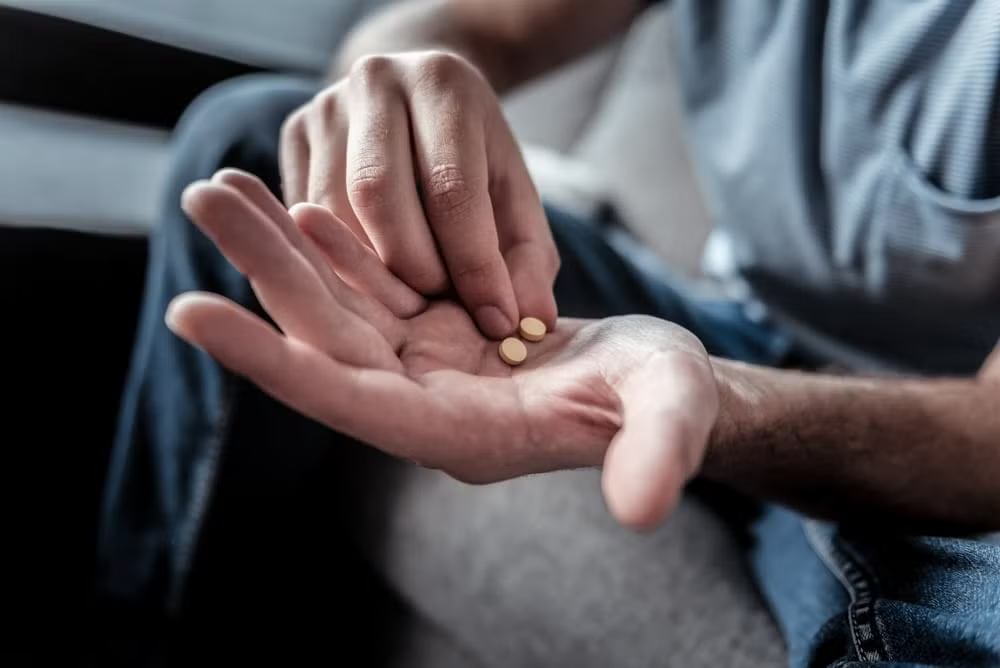Medication-Assisted Treatment Program in New Hampshire
What Is a MAT Program?
A medication-assisted treatment (MAT) program designed to treat mental health disorders. The program combines medication with mental health counseling and other behavioral therapies to create a comprehensive treatment plan for mental health. MAT programs are often used in tandem with traditional mental health treatment plans, such as psychotherapy or cognitive-behavioral therapy (CBT) to deliver a comprehensive method of substance abuse treatment. With the Food and Drug Administration’s (FDA) authorization, these medications can be utilized in conjunction with this program for maximum success.
Medication-assisted treatment (MAT) is a highly effective solution for treating opioid addiction. It is effective because it combines medication with counseling and other behavioral therapies to create an effective treatment plan. The combination of these treatments has been proven effective in reducing opioid overdose deaths by nearly 50%. MAT treatment can help reduce opioid cravings, lessen opioid withdrawal symptoms, and improve an individual’s overall quality of life. MAT can also help individuals regain hope and remain committed to their recovery goals. If you or someone you know is struggling with opioid dependence, do not hesitate to reach out for help and explore MAT as a treatment option. With the right support and resources, it is possible to achieve successful long-term recovery.
Medication-assisted treatment is a form of therapy that uses specific medications to achieve the following goals:
- Normalize bodily functions without experiencing the highs and lows associated with substance consumption.
- Diminish the pleasurable effects of opioids and alcohol to reduce cravings.
- Conquer psychological cravings
- Balance your brain chemicals to enhance mental health and well-being.
What Are the Benefits of Medication-Assisted Treatment?
The medication-assisted treatment brings a wide variety of advantages, such as:
- A decrease in dangerous illegal drug use and its associated legal consequences
- Prevention of relapse when integrated with counseling or behavioral therapies
- Make quitting easier and safer by controlling cravings and reducing symptoms.
- Controlled, safer medications can drastically improve retention rates in addiction treatment programs.
- Reduced threat of overdose-related death
The Effectiveness of a MAT Program

In 2018, it is estimated that around 2.15 million people in the USA have an opioid use disorder which includes addiction to prescription pain medications, heroin, and other opiates. Fortunately, opioid treatment programs, such as medication-assisted treatment, are highly effective when it comes to treating opioid dependence. MAT has been exceptionally successful at significantly reducing the need for costly inpatient detoxification services.
The primary purpose of a MAT program is to help individuals completely recover and become self-sufficient. MAT treatment has enabled people with substance use disorders to:
- Stop using illegal opiates
- Decrease criminal activity
- Improve birth outcomes for pregnant women who are struggling with addiction
- Increase the ability to gain or maintain employment
- Accelerate the healing of patients and improve recovery rates
- Maximize therapy adherence and ensure long-term success
Scientific studies have clearly demonstrated that therapies and medications can drastically reduce an individual’s chances of contracting hepatitis C or HIV, by decreasing opioid use and associated risky behaviors through the use of drug injection.
What Are Different Forms of Medication-Assisted Treatment?
The Food and Drug Administration has endorsed various forms of medication-assisted treatment to help individuals with opioid use disorder manage withdrawal symptoms and reduce cravings. MAT medications correct the chemical imbalance that leads to psychological cravings and symptoms, providing long-term relief without replacing one drug with another. Evidenced-based MAT treatments are clinically proven to be successful in the treatment of opioid use disorder, which guarantees safe and powerful treatment options for individuals facing such a condition.
Alcohol Use Disorders Medications
Disulfiram, naltrexone, and acamprosate are the most common medications for individuals with alcohol withdrawal symptoms. MAT program medications do not provide a cure for alcohol use disorder, but they are the most effective at helping individuals manage their alcohol withdrawal symptoms.
Opioid Dependency Medications
Methadone, naltrexone, and buprenorphine are three medications that can be part of a Medication Assisted Treatment (MAT) program. These drugs have been proven to effectively treat withdrawal symptoms in individuals who are dependent on opioids such as heroin, codeine, and morphine while also helping those who use semi-synthetic opioids like hydrocodone or oxycodone. Not only is it safe to use these MAT medications for short periods but they can even be used over extended durations – months, years, or indefinitely!
Opioid Overdose Prevention Medication
Naloxone is a life-saving medication used to prevent opioid overdose by reversing the drug’s harmful effects. The World Health Organization (WHO) has identified naloxone as one of the most essential medications in any functional healthcare system, blocking euphoric feelings and intoxicating effects caused by opioids.
Naloxone is an invaluable asset for individuals struggling with alcohol use disorder, providing them with the necessary tools to:
- Remain in treatment
- Follow their prescribed medications
- Abstain from relapse

Additional Medications Used in Medication-Assisted Treatment
Acamprosate
Acamprosate is an effective medication-assisted treatment for individuals in active recovery who have quit drinking and wish to maintain sobriety. It efficiently stops individuals from drinking alcohol, yet it, unfortunately, doesn’t guard them against withdrawal symptoms after they consume alcohol. This form of therapy proves effective for people still taking illicit drugs, misusing prescription medications, and even continuing to drink alcohol.
To ensure maximum efficacy, individuals should begin taking acamprosate on their fifth day of abstaining from substance use. The medication reaches its full effectiveness in about five to eight days and it can be taken in oral tablet form three times a day around the same time each day for optimal results.
The principal side effects of this medication are as follows:
- Difficulty sleeping
- Upset stomach
- Appetite loss
- Dizziness
- Diarrhea
- Anxiety
Disulfiram
Disulfiram tablets offer a reliable treatment for chronic alcoholism, but they are most effective when taken by individuals who have recently gone through detoxification and at the early stages of alcohol abstinence. However, it’s important to note that those under intoxication must never take this medication as it will be rendered ineffective.
Disulfiram produces an unpleasant reaction, including;
- Difficulty breathing
- Chest pains
- Headache
- Vomiting
- Nausea
MAT Program Reduces Withdrawal Symptoms
People can experience a range of withdrawal symptoms from drug use, which is why medications are an integral part of many medical detox protocols. Medication-assisted treatment helps to manage these uncomfortable and sometimes dangerous effects, as they differ depending on the following aspects:
- length and severity of drug abuse
- type of substance used
- the duration that it was taken for
Withdrawal symptoms may range from minor to unbearable and sometimes even life-threatening. People react differently based on which substance they use and other psychological elements.
In particular, those with extreme alcohol addiction may suffer severe side effects such as:
- An altered state of consciousness
- Hallucinations
- Cognitive decline
- Restlessness
- Convulsions
- Delirium
MAT treatment is an effective way to reduce withdrawal symptoms, making the detox process safer and easier. In addition, these programs can immensely reduce the impact of such symptoms by helping people slowly reduce how much of a drug they are taking.
Can Medication-Assisted Treatment Be Used for Other Addictions?
When treating addictions in a clinical setting, even though FDA-approved medications might not be available yet, practitioners often employ the MAT treatment approach. For instance, clonidine can be used to help reduce withdrawal symptoms associated with alcohol and opioid abuse while anticonvulsant medications are more suitable for benzodiazepine withdrawal management.
The traditional method for weaning off benzodiazepines is to gradually reduce the dosage though, this may not always be feasible. In such cases, additional measures may need to be taken in order to manage withdrawal symptoms like irritability and seizures.
Several different medications are being studied as potential treatments for Medication-Assisted Treatment (MAT) to deal with symptoms of benzodiazepine withdrawal. Some addiction treatment centers may even dispense prescription drugs to help with the distressing symptoms of benzo withdrawal.
Is Medication-Assisted Treatment Safe?
When someone is suffering from a substance use disorder, their safety remains the utmost priority when deciding on treatment. Fortunately, medication-assisted therapy offers an effective solution that doesn’t result in increased highs due to the correct usage of medications prescribed for opioid withdrawal. Doing this can help to reduce the chances of becoming addicted to drugs or alcohol.
Several medications used for medication-assisted therapy block the effects of drugs, and help to manage withdrawal symptoms. Most notably, Suboxone is composed of naloxone – an opioid receptor antagonist that has a low risk of overdose when taken correctly. As such, it is generally deemed safe and effective in treating those suffering from opioid dependence or addiction.
Misusing Suboxone by injecting it can bring about intense withdrawal symptoms, however when taken properly and in conjunction with medical supervision, the drug is known to be safe and effective. Just like Suboxone, methadone – a full opioid agonist- has been utilized for many years as an addiction treatment solution while being carefully monitored and dispensed under appropriate circumstances.
Suboxone and methadone are both reliable for long-term detoxification treatment. However, many people recognize that Suboxone is the more secure option with fewer chances of medication interactions and side effects.
Before settling on medication-assisted therapy, it’s wise to consult with your healthcare provider. Your doctor will be able to assist you in selecting the optimal form of treatment that best meets your needs and assess the associated benefits and drawbacks of medication-assisted treatment. Additionally, they can help give you a detailed overview of all available options so that you may make an informed decision.
Medication-Assisted Therapy Awaits at Live Free Recovery
Looking for lasting relief and recovery from opioid dependence?
Let Live Free Recovery provide you with the Medication-Assisted Therapy you need to find freedom from addiction. Live Free treatment centers offer Medication Assisted Treatment as part of outpatient treatment. It is a very good place to start when it comes to opioid treatment programs, as they provide quality services and individualized care. It provides adults struggling with opioid addiction access to medication-assisted therapy (MAT) and a full range of integrated services that are uniquely tailored to each client’s needs.
Medication-assisted treatment (MAT) has proven to be a much better and safer way of addressing substance use disorder than traditional methods. Our highly trained, friendly staff at Live Free Recovery can help you determine if MAT is the best option for your particular situation.
Get in touch with us now to begin the journey toward sobriety!
References:
https://www.samhsa.gov/medication-assisted-treatment
Take the First Step Towards a Brighter Tomorrow
At Live Free Recovery, we’re committed to walking alongside you on every step of your journey. Our compassionate team is here to provide the guidance and support you need to overcome addiction and reclaim your life. Don’t wait—reach out today to speak with someone who truly understands your struggles and can help you take that important first step toward healing and a fresh start.
Your path to recovery starts here.
